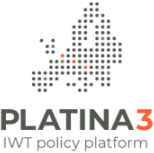Executive summary
Right skills for green jobs are certainly the prerequisite to make the transition to a greener economy happen.[1] Today, skills gaps are already recognized as a major bottleneck in a number of sectors,[2] and the inland waterways sector, which relies on a skilled workforce, is no exception.
According to the Communication from the European Commission NAIADES III: Boosting future-proof European inland waterway transport[3] “The current and future workforce needs to be equipped with the right skills to deal with the green and digital transitions, cyber-security, synchromodality and the automation of vessels and infrastructure. (…) The Commission therefore will also mandate CESNI to prepare standards for skills for alternative fuels operations and for environment-friendly and efficient vessel operation (eco navigation).”
This energy transition represents a great challenge for the workforce. Inland Waterway Transport (IWT) personnel needs support for a transition to a zero emissions fleet. This transition includes the use of alternative fuels, batteries and electric propulsion systems for which new standards for competence of personnel is needed. In terms of relevant new energy sources and energy carriers, an analysis of pilot projects that have received recommendations from the CCNR or from national bodies (the case of the pusher ELEKTRA operating in Germany) have shown that at least methanol and hydrogen as alternative fuels, batteries and electric propulsion systems should be looked at. So far, the European Standard for Qualifications in Inland Navigation (ES-QIN) does not cover these alternative fuels and technologies. First discussions of the safety risks related to the new sources of energy in CESNI as well as consultation of battery manufacturers and operators of pilot projects have lead to a first set of competences. These competences can be split in a general part, applicable for all alternative fuels, batteries and electric propulsion systems and a more specific part. The work was carried out within the PLATINA3 consortium in cooperation with the permanent working group of CESNI for professional qualifications (CESNI/QP). The latter, assisted by experts from DG MOVE also reflected on the legal framework of introducing such new standards of competence.
In this context, this report aims to identify the competences to deal with alternative fuels, propulsion technology and exhaust gas aftertreatment systems that can be proposed to update ES-QIN and provides an overview of discussion already carried out in CESNI/QP.
[1] International Labor Organization, Skills for Green Jobs: A Global View, 2011, https://www.ilo.org/global/publications/ilo-bookstore/order-online/books/WCMS_159585/lang–en/index.htm
[2] Ibid.
[3] Communication from the Commission to the European Parliament, the Council, the European Economic and Social Committee and the Committee of the regions NAIADES III: Boosting future-proof European inland waterway transport, 24.6.2021, COM(2021) 324 final.

